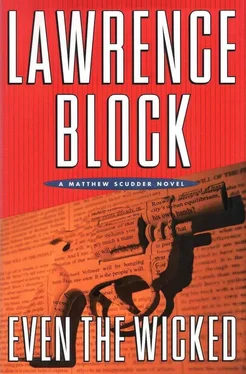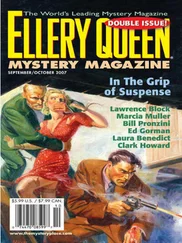Judge Marvin Rome managed to view Will’s attack as an assault on civil liberties and the rights of the accused. The one time I saw him on the news, he was linking Will with prosecutors and police officers who were willing to call an end run around the Bill of Rights in order to railroad a defendant — “invariably poor, and all too often black” — into a prison cell. Will’s threat, he assured the public, would no more lead him to compromise his principles than had the vilification he’d received over the years from DAs and cops and their lackeys in the press. He would go on dispensing true justice and tempering it with mercy.
Regis Kilbourne turned the whole thing into a free-speech issue, lamenting a world in which a critic might feel constrained in any way from the free expression of his views. He went on to say the worst constraints came not from government censorship or his newspaper’s editorial policy, but from “those very aspects of oneself one tends to regard as emblematic of one’s better nature.” Friendship, compassion, and a sense of fair play seemed to be the worst offenders, tempting one to give a kinder, gentler review than the material might otherwise deserve. “If I have dared to inflict pain, to destroy a cherished relationship, to crush a perhaps promising career, all for the sake of a higher truth, can simple physical fear possibly sway me from my course? Indeed, it cannot and it will not.”
They were all going to carry on bravely, but that didn’t mean they were ready to make Will’s work easier for him. Peter Tully declined police protection but went about guarded by a thuggish phalanx of husky well-armed union members. Judge Rome accepted the NYPD’s offer and supplemented their ranks with some additional cops he hired as moonlighters. (This struck some people as curious, and a Post reporter quoted an unnamed source: “If Will really wants to kill Harold Rome, odds are he’s a cop himself.”) Regis Kilbourne also took the police protection, and, at each of the openings and previews he attended, his companion was not one of the dewy-eyed and pouting young women he favored, but a burly plainclothes cop with a five o’clock shadow and an expression of bored bemusement.
Will’s letter, targeting three prominent New Yorkers at once, would have been enough all by itself to keep the story hot for a week or more. Long before it had a chance to die down, McGraw broke the news that Adrian Whitfield, already famous as Will’s most recent victim, had now been definitely determined by police investigators to have been Will himself. (One of the TV news shows hit the air with a news flash hours before the Daily News was on the street with it, but Marty was the first to have all the details.)
While nobody knew quite what to make of it, everybody remained determined to make the most of it. I’d hoped the cops would keep me out of it, and they may have done what they could, but there was just too much media attention for anyone to slip by unnoticed. After the first phone call we learned to let the answering machine screen everything. I took to leaving my building via the service entrance, which kept to a minimum the number of reporters who caught up with me. I had to enter through the lobby, however, and that was when they were apt to corner me, sometimes with microphones and cameras, sometimes with notebooks. I was poor fodder for either medium, though, shouldering wordlessly past them, giving them nothing, not even a smile or a frown.
I saw myself on TV one evening. I was visible for less time than it took an off-camera voice to identify me as the Manhattan-based private detective, formerly employed by Adrian Whitfield, whose investigation into his client’s death had led to Whitfield’s unmasking. “It’s great,” Elaine said. “You could very easily look angry or impatient or guilty or embarrassed, the way people do when they won’t talk to the press. But instead you manage to look sort of harried and oblivious, like a man trying to get off a crowded subway car before they close the doors.”
I’ve been in the limelight before over the years, though it’s never shined that brightly on me, nor have I basked in it for very long. I’ve never cared for it and I didn’t like it any better this time around. Fortunately it didn’t seem to affect me much. A few people at AA meetings made veiled reference to my momentary fame. “I’ve been reading about you in the papers,” they might say, or, “Saw you on TV the other night.” I would deflect the remark with a smile and a shrug, and nobody pursued the subject. The greater portion of my AA acquaintances couldn’t make a connection between the PI named Scudder who’d unmasked Will and that guy Matt who usually sat in the back row. They might know my story, but relatively few of them knew my last name. AA is like that.
I didn’t stay that hot for that long, perhaps because I managed to avoid adding any fuel to the fire myself. The press didn’t need me to build the case against Adrian Whitfield, which got a little stronger and solider day by day. If there’d been room for doubt, the police kept finding bits of hard evidence to fill it in. Airline and hotel employees had ID’d his photo, and NYNEX records had turned up some calls that didn’t admit to a more innocent explanation, including two to a residential hotel on upper Broadway. There was no way to guess what hotel guest he’d talked to, but Richie Vollmer had been living there, registered under an alias, and both calls were logged the day before Richie’s death.
The clearer it became that Adrian was the original Will, the murkier the waters grew around Will #2. A whole string of deaths had given the first Will a grim credibility. A threat, after all, has a certain undeniable authority when it’s uttered by a man with blood on his hands.
But when the threat comes from a copycat, and when everybody damn well knows he’s a copycat, how much weight do you attach to it? That was a question that was getting asked a lot, on TV and in the papers, and I can only assume the police were asking it themselves. As far as anyone could tell, the man (or woman, for all anyone knew) who’d written out a death sentence for the unlikely partnership of Tully, Rome & Kilbourne had never killed anything but time. That being the case, how much of a danger was he? And what did you do about it?
You had to do something. They still empty schools and office buildings when some joker phones in a bomb threat, even when they know it’s almost certainly a hoax. The fire engines roll when the alarm goes off, the fact notwithstanding that most calls turn out to be false alarms. (The NYFD started taking down most of their red streetcorner call boxes when statistics showed that virtually all alarms called in from the street were the work of pranksters. But they had to physically dismantle the boxes. They couldn’t leave them standing and ignore the alarms.)
Meanwhile, everybody waited to see what would happen next. The three men named in Will’s letter probably waited with a little more urgency than the rest of the public, but even they probably found themselves paying a little less attention as the days passed and nothing untoward took place.
Like Benny the Suitcase, bored to tears with the job of starting Tony Furillo’s car every morning. Complaining that nothing ever happened.
One day I caught a noon meeting at the Citicorp building and spent an hour or two in the stores, trying to get an early start on my Christmas shopping. I didn’t find a thing to buy, and I just wound up feeling overwhelmed by the season.
It happens every year. Even before the Salvation Army Santas can get out there and start competing with the homeless for handouts, I find myself haunted by all the ghosts of Christmas past.
I’ve largely come to terms with the failure of my first marriage, with my shortcomings as a husband and a father. “Clearing up the wreckage of the past” is what they call that ritual in AA, and it’s a process you neglect at your peril.
Читать дальше












